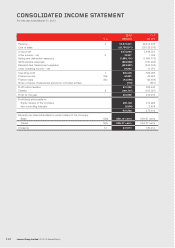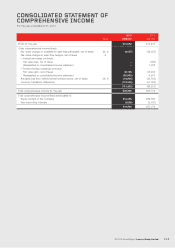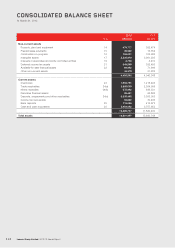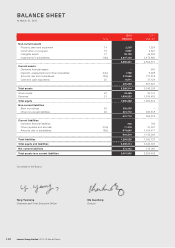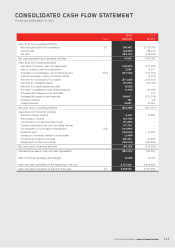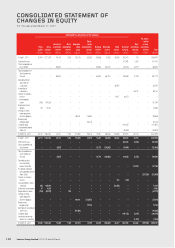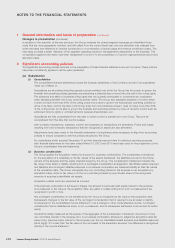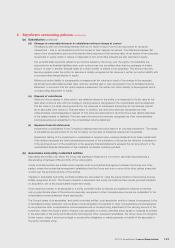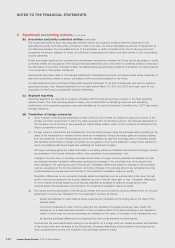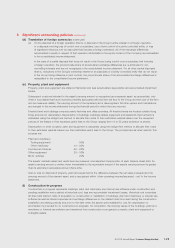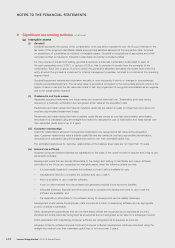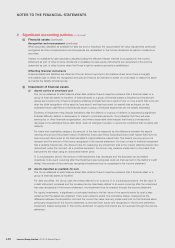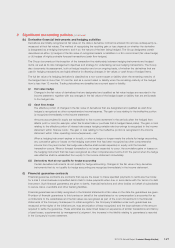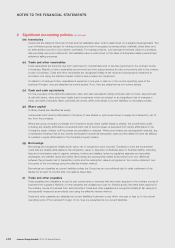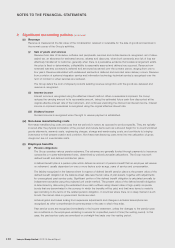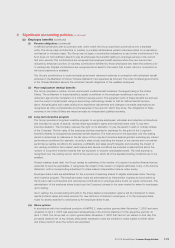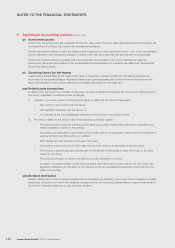Lenovo 2013 Annual Report Download - page 124
Download and view the complete annual report
Please find page 124 of the 2013 Lenovo annual report below. You can navigate through the pages in the report by either clicking on the pages listed below, or by using the keyword search tool below to find specific information within the annual report.
NOTES TO THE FINANCIAL STATEMENTS
Lenovo Group Limited 2012/13 Annual Report
122
2 Significant accounting policies (continued)
(b) Associates and jointly controlled entities (continued)
The Group determines at each reporting date whether there is any objective evidence that the investment in the
associate and jointly controlled entity is impaired. If this is the case, the Group calculates the amount of impairment as
the difference between the recoverable amount of the associate or jointly controlled entity and its carrying value and
recognizes the amount adjacent to ‘share of profit/(loss) of associates and jointly controlled entities’ in the consolidated
income statement.
Profits and losses resulting from upstream and downstream transactions between the Group and its associates or jointly
controlled entities are recognized in the Group’s financial statements only to the extent of unrelated investor’s interests in
the associates or the jointly controlled entities. Unrealized losses are eliminated unless the transaction provides evidence
of an impairment of the assets transferred.
Adjustments have been made to the financial statements of associates and jointly controlled entities where necessary to
align their accounting policies to ensure consistency with the policies adopted by the Group.
For associates and jointly controlled entities which adopted December 31 as their financial year end date for statutory
reporting purposes, their financial statements for the years ended March 31, 2012 and 2013 have been used for the
preparation of the Group’s consolidated financial statements.
(c) Segment reporting
Operating segments are reported in a manner consistent with the internal reporting provided to the chief operating
decision-maker. The chief operating decision-maker, who is responsible for allocating resources and assessing
performance of the operating segments, has been identified as the Lenovo Executive Committee (the “LEC”) that makes
strategic decisions.
(d) Translation of foreign currencies
(i) Items included in the financial statements of each of the Group’s entities are measured using the currency of the
primary economic environment in which the entity operates (the “functional currency”). The financial statements of
the Company and of the Group are presented in United States dollars, which is the Company’s functional and the
Group’s presentation currency.
(ii) Foreign currency transactions are translated into the functional currency using the exchange rates prevailing at the
dates of the transactions or valuation where items are re-measured. Foreign exchange gains and losses resulting
from the settlement of such transactions and from the translation at year-end exchange rates of monetary assets
and liabilities denominated in foreign currencies are recognized in the income statement, except when deferred in
equity as qualifying cash flow hedges and qualifying net investment hedges.
All foreign exchange gains and losses that relate to monetary assets and liabilities denominated in foreign currency
are presented in the income statement within ‘other operating income/(expenses) – net’.
Changes in the fair value of monetary securities denominated in foreign currency classified as available-for-sale
are analyzed between translation differences resulting from changes in the amortized cost of the security and
other changes in the carrying amount of the security. Translation differences related to changes in the amortized
cost are recognized in the income statement, and other changes in the carrying amount are recognized as other
comprehensive income/expense and included in the investment revaluation reserve in equity.
Translation differences on non-monetary financial assets and liabilities such as equities held at fair value through
profit or loss are recognized in the income statement as part of the fair value gain or loss. Translation differences
on non-monetary financial assets such as equities classified as available-for-sale are recognized as other
comprehensive income/expense and included in the investment revaluation reserve in equity.
(iii) The results and financial position of all the group entities that have a functional currency different from the Group’s
presentation currency are translated into the presentation currency as follows:
– assets and liabilities for each balance sheet presented are translated at the closing rate at the date of that
balance sheet;
– income and expenses for each income statement are translated at average exchange rates (unless this
average is not a reasonable approximation of the cumulative effect of the rates prevailing on the transaction
dates, in which case income and expenses are translated at the rates on the dates of the transactions); and
– all resulting exchange differences are recognized as other comprehensive income/expense.
Goodwill and fair value adjustments arising on the acquisition of a foreign entity are treated as assets and liabilities
of the foreign entity and translated at the closing rate. Exchange differences arising therefrom are recognized as
other comprehensive income and included in the exchange reserve in equity.


